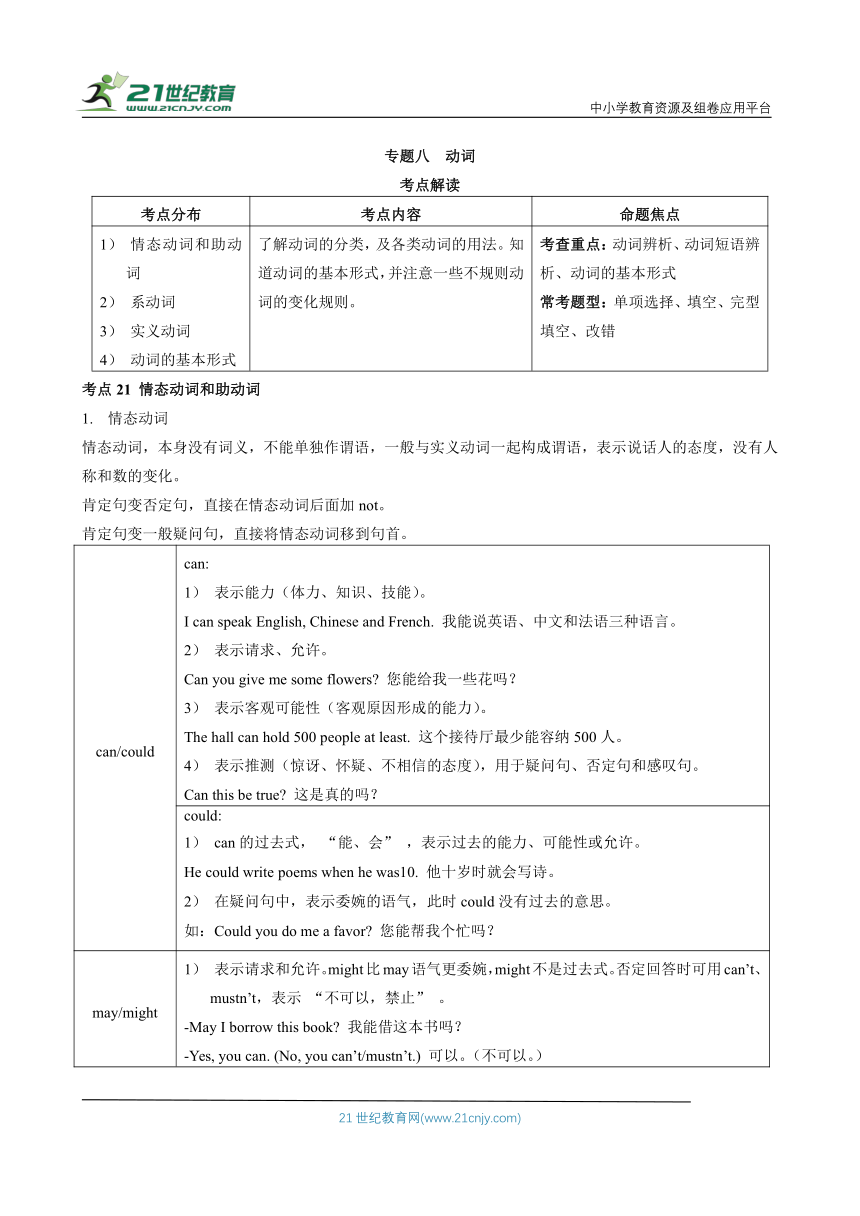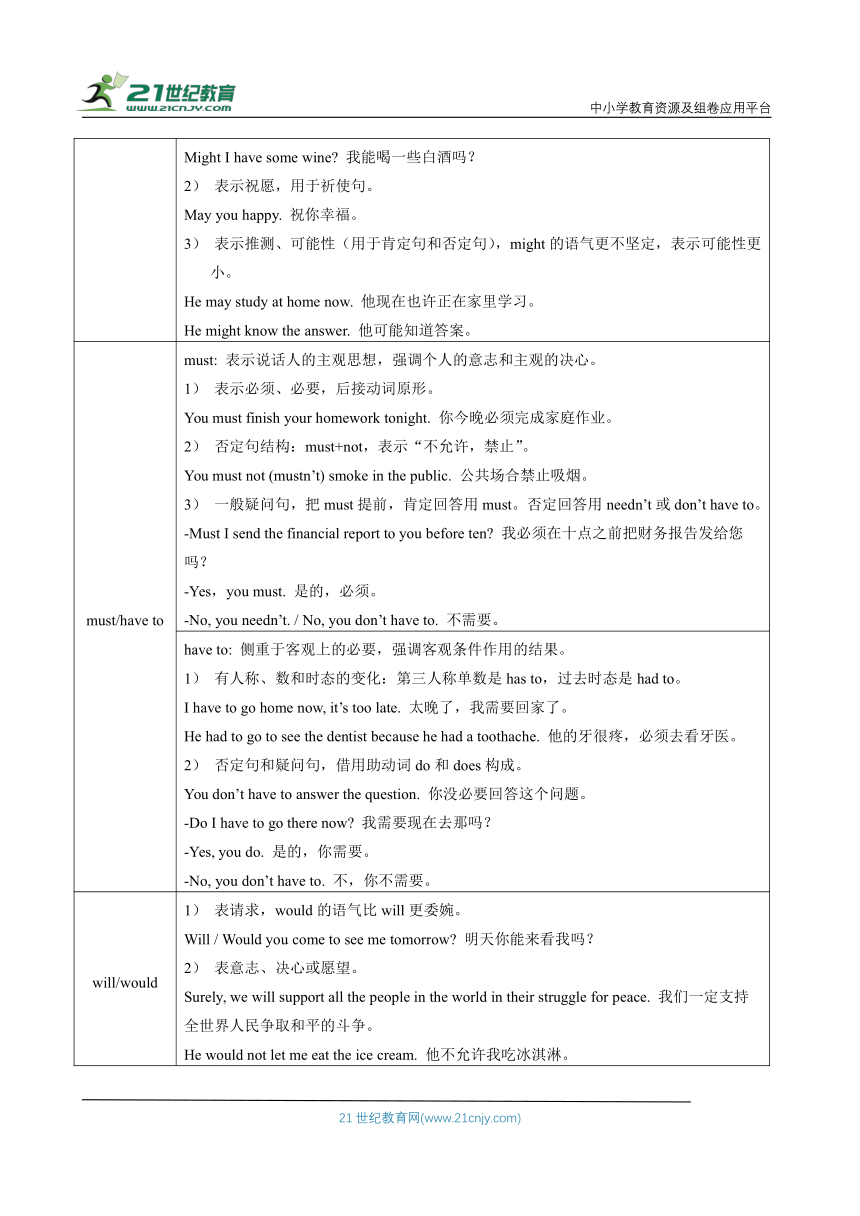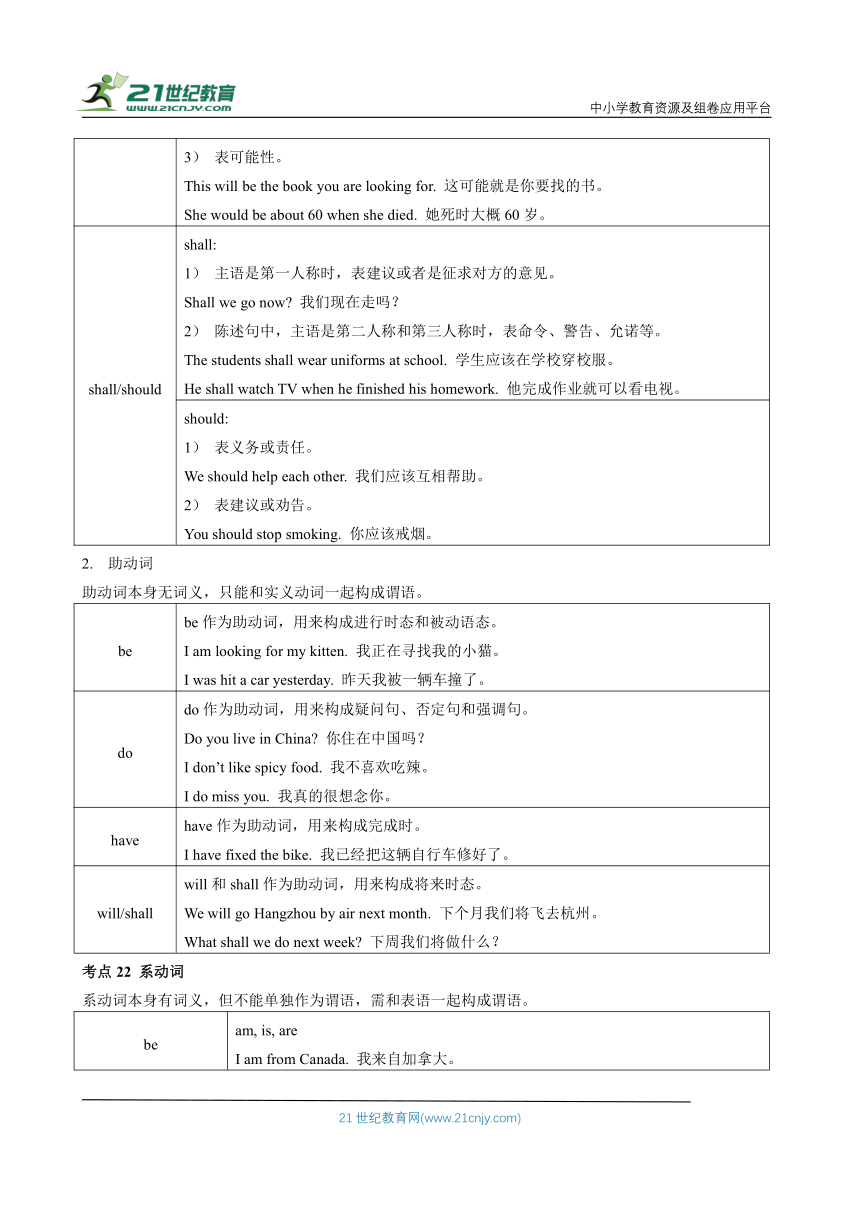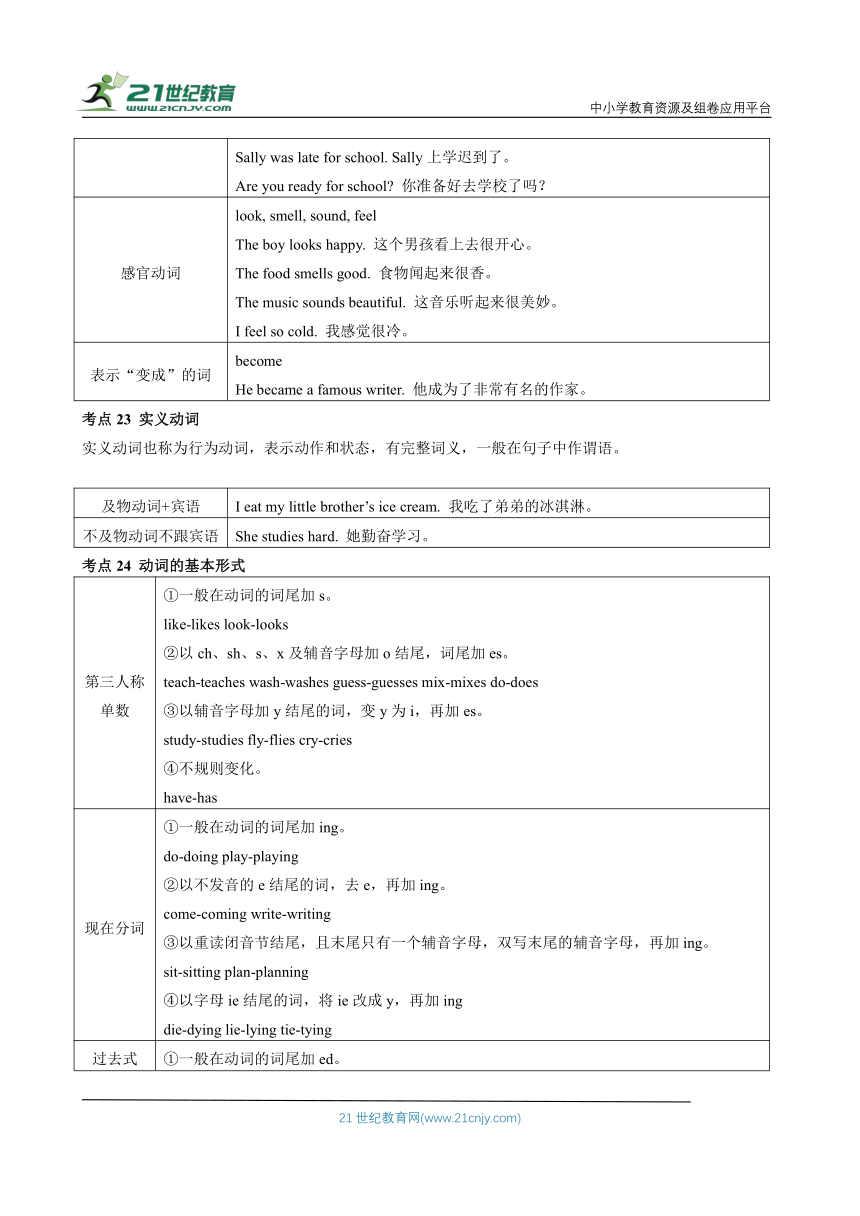小升初英语满分突破集训 系列 (全国通用版) 8专题八 动词 学案 (含答案)
文档属性
| 名称 | 小升初英语满分突破集训 系列 (全国通用版) 8专题八 动词 学案 (含答案) |  | |
| 格式 | docx | ||
| 文件大小 | 1.0MB | ||
| 资源类型 | 试卷 | ||
| 版本资源 | 通用版 | ||
| 科目 | 英语 | ||
| 更新时间 | 2022-06-09 15:54:43 | ||
图片预览




文档简介
中小学教育资源及组卷应用平台
专题八 动词
考点解读
考点分布 考点内容 命题焦点
情态动词和助动词 系动词 实义动词 动词的基本形式 了解动词的分类,及各类动词的用法。知道动词的基本形式,并注意一些不规则动词的变化规则。 考查重点:动词辨析、动词短语辨析、动词的基本形式 常考题型:单项选择、填空、完型填空、改错
考点21 情态动词和助动词
情态动词
情态动词,本身没有词义,不能单独作谓语,一般与实义动词一起构成谓语,表示说话人的态度,没有人称和数的变化。
肯定句变否定句,直接在情态动词后面加not。
肯定句变一般疑问句,直接将情态动词移到句首。
can/could can: 表示能力(体力、知识、技能)。 I can speak English, Chinese and French. 我能说英语、中文和法语三种语言。 表示请求、允许。 Can you give me some flowers 您能给我一些花吗? 表示客观可能性(客观原因形成的能力)。 The hall can hold 500 people at least. 这个接待厅最少能容纳500人。 表示推测(惊讶、怀疑、不相信的态度),用于疑问句、否定句和感叹句。 Can this be true 这是真的吗?
could: can的过去式, “能、会” ,表示过去的能力、可能性或允许。 He could write poems when he was10. 他十岁时就会写诗。 在疑问句中,表示委婉的语气,此时could没有过去的意思。 如:Could you do me a favor 您能帮我个忙吗?
may/might 表示请求和允许。might比may语气更委婉,might不是过去式。否定回答时可用can’t、mustn’t,表示 “不可以,禁止” 。 -May I borrow this book 我能借这本书吗? -Yes, you can. (No, you can’t/mustn’t.) 可以。(不可以。) Might I have some wine 我能喝一些白酒吗? 表示祝愿,用于祈使句。 May you happy. 祝你幸福。 表示推测、可能性(用于肯定句和否定句),might的语气更不坚定,表示可能性更小。 He may study at home now. 他现在也许正在家里学习。 He might know the answer. 他可能知道答案。
must/have to must: 表示说话人的主观思想,强调个人的意志和主观的决心。 表示必须、必要,后接动词原形。 You must finish your homework tonight. 你今晚必须完成家庭作业。 否定句结构:must+not,表示“不允许,禁止”。 You must not (mustn’t) smoke in the public. 公共场合禁止吸烟。 一般疑问句,把must提前,肯定回答用must。否定回答用needn’t或don’t have to。 -Must I send the financial report to you before ten 我必须在十点之前把财务报告发给您吗? -Yes,you must. 是的,必须。 -No, you needn’t. / No, you don’t have to. 不需要。
have to: 侧重于客观上的必要,强调客观条件作用的结果。 有人称、数和时态的变化:第三人称单数是has to,过去时态是had to。 I have to go home now, it’s too late. 太晚了,我需要回家了。 He had to go to see the dentist because he had a toothache. 他的牙很疼,必须去看牙医。 否定句和疑问句,借用助动词do和does构成。 You don’t have to answer the question. 你没必要回答这个问题。 -Do I have to go there now 我需要现在去那吗? -Yes, you do. 是的,你需要。 -No, you don’t have to. 不,你不需要。
will/would 表请求,would的语气比will更委婉。 Will / Would you come to see me tomorrow 明天你能来看我吗? 表意志、决心或愿望。 Surely, we will support all the people in the world in their struggle for peace. 我们一定支持全世界人民争取和平的斗争。 He would not let me eat the ice cream. 他不允许我吃冰淇淋。 表可能性。 This will be the book you are looking for. 这可能就是你要找的书。 She would be about 60 when she died. 她死时大概60岁。
shall/should shall: 主语是第一人称时,表建议或者是征求对方的意见。 Shall we go now 我们现在走吗? 陈述句中,主语是第二人称和第三人称时,表命令、警告、允诺等。 The students shall wear uniforms at school. 学生应该在学校穿校服。 He shall watch TV when he finished his homework. 他完成作业就可以看电视。
should: 表义务或责任。 We should help each other. 我们应该互相帮助。 表建议或劝告。 You should stop smoking. 你应该戒烟。
助动词
助动词本身无词义,只能和实义动词一起构成谓语。
be be作为助动词,用来构成进行时态和被动语态。 I am looking for my kitten. 我正在寻找我的小猫。 I was hit a car yesterday. 昨天我被一辆车撞了。
do do作为助动词,用来构成疑问句、否定句和强调句。 Do you live in China 你住在中国吗? I don’t like spicy food. 我不喜欢吃辣。 I do miss you. 我真的很想念你。
have have作为助动词,用来构成完成时。 I have fixed the bike. 我已经把这辆自行车修好了。
will/shall will和shall作为助动词,用来构成将来时态。 We will go Hangzhou by air next month. 下个月我们将飞去杭州。 What shall we do next week 下周我们将做什么?
考点22 系动词
系动词本身有词义,但不能单独作为谓语,需和表语一起构成谓语。
be am, is, are I am from Canada. 我来自加拿大。 Sally was late for school. Sally上学迟到了。 Are you ready for school 你准备好去学校了吗?
感官动词 look, smell, sound, feel The boy looks happy. 这个男孩看上去很开心。 The food smells good. 食物闻起来很香。 The music sounds beautiful. 这音乐听起来很美妙。 I feel so cold. 我感觉很冷。
表示“变成”的词 become He became a famous writer. 他成为了非常有名的作家。
考点23 实义动词
实义动词也称为行为动词,表示动作和状态,有完整词义,一般在句子中作谓语。
及物动词+宾语 I eat my little brother’s ice cream. 我吃了弟弟的冰淇淋。
不及物动词不跟宾语 She studies hard. 她勤奋学习。
考点24 动词的基本形式
第三人称单数 ①一般在动词的词尾加s。 like-likes look-looks ②以ch、sh、s、x及辅音字母加o结尾,词尾加es。 teach-teaches wash-washes guess-guesses mix-mixes do-does ③以辅音字母加y结尾的词,变y为i,再加es。 study-studies fly-flies cry-cries ④不规则变化。 have-has
现在分词 ①一般在动词的词尾加ing。 do-doing play-playing ②以不发音的e结尾的词,去e,再加ing。 come-coming write-writing ③以重读闭音节结尾,且末尾只有一个辅音字母,双写末尾的辅音字母,再加ing。 sit-sitting plan-planning ④以字母ie结尾的词,将ie改成y,再加ing die-dying lie-lying tie-tying
过去式 ①一般在动词的词尾加ed。 work-worked stay-stayed ②以不发音的e结尾,词尾只加d。 close-closed like-liked ③以辅音字母加y结尾,变y为i,再加ed。 carry-carried study-studied ④以重读闭音节结尾,且末尾只有一个辅音字母,双写末尾的辅音字母再加ed。 stop-stopped plan-planned ⑤不规则变化。 go-went see-saw sing-sang
【经典分析】
【例1】My sister buys some books.(改成否定句)
[思路指导]变否定句,buys变成doesn’t buy,some变成any。
[参考答案]My sister doesn’t buy any books.
【例2】You go and ask her. She know the answer.
A. must, can B. must, may C. need, can D. can, may
[思路指导]句意:你可以去问问她,她也许知道答案。这里出现了四个情态动词。must表示“必须”;can表示“能够,允许”;need表示“需要”,may表示“可能”。根据情态动词的意思来解题。
[参考答案]D
附录:不规则动词的变化(以北京版教材为准)
动词 过去式 动词 过去式
be was, were leave left
become became let let
begin began lose lost
break broke make made
bring brought may might
build built meet met
buy bought must must
can could pay paid
come came put put
do did read read
draw drew run ran
drink drank say said
drive drove see saw
eat ate sell sold
feed fed sing sang
feel felt sit sat
find found sleep slept
fly flew speak spoke
forget forgot stand stood
get got swim swam
give gave take took
go went teach taught
have had tell told
hear heard think thought
hold held wear wore
hurt hurt will would
keep kept win won
know knew write wrote
强化训练
完型填空。
The students 1. having their chemistry class. Miss Li was telling the children what water was like. After that, she 2. her student, “What’s water ” No one 3. for a few minutes. Miss Li asked 4. , “Why don’t you answer my question Didn’t I 5. you what water is like ”
Just then a boy 6. up his hand and said, “Miss Li, you told us that water has 7. colour and no small. But where to find such kind of water The water in the river behind my house 8. always black and it has a bad smell.” Most of the children agreed 9. him.
“I’m sorry, children,” said the teacher, “our water is 10. dirtier. That’s a problem.”
( )1. A. was B. were C. are
( )2. A. asked B. ask C. asks
( )3. A. speaks B. speak C. spoke
( )4. A. again B. her C. him
( )5. A. told B. tell C. tells
( )6. A. puts B. put C. putted
( )7. A. no B. not C. none
( )8. A. is B. was C. are
( )9. A. in B. at C. with
( )10. A. gets B. getting C. geting
单项选择。
( )1. I Mary on my way home yesterday.
A. meet B. meeted C. met D. meets
( )2. -What did you do last night -I watched TV and storybooks.
A. reads B. read C. will read D. was reading
( )3. -Will Dad be back home at 6 o’clock this evening -He should, but he not. Sometimes he exercises after work.
A. can B. must C. need D. may
( )4. We should keep quiet in the cinema. We speak loudly.
A. can B. must C. needn’t D. mustn’t
( )5. When President Xi Jinping has spare time, he enjoys and sports.
A. read B. reads C. to read D. reading
( )6. Where you come from
A. are B. do C. does D. is
( )7. -What can you in the picture -I at it, but I can’t anything.
A. look; look; look for B. see; see; look for C. see; look; find D. see; see; find
( )8. John very happy.
A. watches B. sees C. looks D. finds
( )9. -What did you do last week -I .
A. go swimming B. did my homework C. went swim D. goes fishing
( )10. Look, the boy can .
A. is swimming B. swim C. swam D. swimming
用所给单词的适当形式填空。
Jack (read) a book now.
(be) you at home last night
What time you (get) up every day
They (visit) the farm last Sunday.
They (fly) to Shanghai yesterday.
Long, long ago, there (live) an old man.
The bus (stop) and an old man got off.
Her ID card number (be) 2200202771212.
I (go) to the dancing party with my friend last Sunday.
Nina always (have) a lot of questions.
参考答案
专题八 动词
BACAB BAACB
CBDDD BCCBB
is reading
Were
do, get
visited
flew
lived
stopped
is
went
has
21世纪教育网(www.21cnjy.com)
专题八 动词
考点解读
考点分布 考点内容 命题焦点
情态动词和助动词 系动词 实义动词 动词的基本形式 了解动词的分类,及各类动词的用法。知道动词的基本形式,并注意一些不规则动词的变化规则。 考查重点:动词辨析、动词短语辨析、动词的基本形式 常考题型:单项选择、填空、完型填空、改错
考点21 情态动词和助动词
情态动词
情态动词,本身没有词义,不能单独作谓语,一般与实义动词一起构成谓语,表示说话人的态度,没有人称和数的变化。
肯定句变否定句,直接在情态动词后面加not。
肯定句变一般疑问句,直接将情态动词移到句首。
can/could can: 表示能力(体力、知识、技能)。 I can speak English, Chinese and French. 我能说英语、中文和法语三种语言。 表示请求、允许。 Can you give me some flowers 您能给我一些花吗? 表示客观可能性(客观原因形成的能力)。 The hall can hold 500 people at least. 这个接待厅最少能容纳500人。 表示推测(惊讶、怀疑、不相信的态度),用于疑问句、否定句和感叹句。 Can this be true 这是真的吗?
could: can的过去式, “能、会” ,表示过去的能力、可能性或允许。 He could write poems when he was10. 他十岁时就会写诗。 在疑问句中,表示委婉的语气,此时could没有过去的意思。 如:Could you do me a favor 您能帮我个忙吗?
may/might 表示请求和允许。might比may语气更委婉,might不是过去式。否定回答时可用can’t、mustn’t,表示 “不可以,禁止” 。 -May I borrow this book 我能借这本书吗? -Yes, you can. (No, you can’t/mustn’t.) 可以。(不可以。) Might I have some wine 我能喝一些白酒吗? 表示祝愿,用于祈使句。 May you happy. 祝你幸福。 表示推测、可能性(用于肯定句和否定句),might的语气更不坚定,表示可能性更小。 He may study at home now. 他现在也许正在家里学习。 He might know the answer. 他可能知道答案。
must/have to must: 表示说话人的主观思想,强调个人的意志和主观的决心。 表示必须、必要,后接动词原形。 You must finish your homework tonight. 你今晚必须完成家庭作业。 否定句结构:must+not,表示“不允许,禁止”。 You must not (mustn’t) smoke in the public. 公共场合禁止吸烟。 一般疑问句,把must提前,肯定回答用must。否定回答用needn’t或don’t have to。 -Must I send the financial report to you before ten 我必须在十点之前把财务报告发给您吗? -Yes,you must. 是的,必须。 -No, you needn’t. / No, you don’t have to. 不需要。
have to: 侧重于客观上的必要,强调客观条件作用的结果。 有人称、数和时态的变化:第三人称单数是has to,过去时态是had to。 I have to go home now, it’s too late. 太晚了,我需要回家了。 He had to go to see the dentist because he had a toothache. 他的牙很疼,必须去看牙医。 否定句和疑问句,借用助动词do和does构成。 You don’t have to answer the question. 你没必要回答这个问题。 -Do I have to go there now 我需要现在去那吗? -Yes, you do. 是的,你需要。 -No, you don’t have to. 不,你不需要。
will/would 表请求,would的语气比will更委婉。 Will / Would you come to see me tomorrow 明天你能来看我吗? 表意志、决心或愿望。 Surely, we will support all the people in the world in their struggle for peace. 我们一定支持全世界人民争取和平的斗争。 He would not let me eat the ice cream. 他不允许我吃冰淇淋。 表可能性。 This will be the book you are looking for. 这可能就是你要找的书。 She would be about 60 when she died. 她死时大概60岁。
shall/should shall: 主语是第一人称时,表建议或者是征求对方的意见。 Shall we go now 我们现在走吗? 陈述句中,主语是第二人称和第三人称时,表命令、警告、允诺等。 The students shall wear uniforms at school. 学生应该在学校穿校服。 He shall watch TV when he finished his homework. 他完成作业就可以看电视。
should: 表义务或责任。 We should help each other. 我们应该互相帮助。 表建议或劝告。 You should stop smoking. 你应该戒烟。
助动词
助动词本身无词义,只能和实义动词一起构成谓语。
be be作为助动词,用来构成进行时态和被动语态。 I am looking for my kitten. 我正在寻找我的小猫。 I was hit a car yesterday. 昨天我被一辆车撞了。
do do作为助动词,用来构成疑问句、否定句和强调句。 Do you live in China 你住在中国吗? I don’t like spicy food. 我不喜欢吃辣。 I do miss you. 我真的很想念你。
have have作为助动词,用来构成完成时。 I have fixed the bike. 我已经把这辆自行车修好了。
will/shall will和shall作为助动词,用来构成将来时态。 We will go Hangzhou by air next month. 下个月我们将飞去杭州。 What shall we do next week 下周我们将做什么?
考点22 系动词
系动词本身有词义,但不能单独作为谓语,需和表语一起构成谓语。
be am, is, are I am from Canada. 我来自加拿大。 Sally was late for school. Sally上学迟到了。 Are you ready for school 你准备好去学校了吗?
感官动词 look, smell, sound, feel The boy looks happy. 这个男孩看上去很开心。 The food smells good. 食物闻起来很香。 The music sounds beautiful. 这音乐听起来很美妙。 I feel so cold. 我感觉很冷。
表示“变成”的词 become He became a famous writer. 他成为了非常有名的作家。
考点23 实义动词
实义动词也称为行为动词,表示动作和状态,有完整词义,一般在句子中作谓语。
及物动词+宾语 I eat my little brother’s ice cream. 我吃了弟弟的冰淇淋。
不及物动词不跟宾语 She studies hard. 她勤奋学习。
考点24 动词的基本形式
第三人称单数 ①一般在动词的词尾加s。 like-likes look-looks ②以ch、sh、s、x及辅音字母加o结尾,词尾加es。 teach-teaches wash-washes guess-guesses mix-mixes do-does ③以辅音字母加y结尾的词,变y为i,再加es。 study-studies fly-flies cry-cries ④不规则变化。 have-has
现在分词 ①一般在动词的词尾加ing。 do-doing play-playing ②以不发音的e结尾的词,去e,再加ing。 come-coming write-writing ③以重读闭音节结尾,且末尾只有一个辅音字母,双写末尾的辅音字母,再加ing。 sit-sitting plan-planning ④以字母ie结尾的词,将ie改成y,再加ing die-dying lie-lying tie-tying
过去式 ①一般在动词的词尾加ed。 work-worked stay-stayed ②以不发音的e结尾,词尾只加d。 close-closed like-liked ③以辅音字母加y结尾,变y为i,再加ed。 carry-carried study-studied ④以重读闭音节结尾,且末尾只有一个辅音字母,双写末尾的辅音字母再加ed。 stop-stopped plan-planned ⑤不规则变化。 go-went see-saw sing-sang
【经典分析】
【例1】My sister buys some books.(改成否定句)
[思路指导]变否定句,buys变成doesn’t buy,some变成any。
[参考答案]My sister doesn’t buy any books.
【例2】You go and ask her. She know the answer.
A. must, can B. must, may C. need, can D. can, may
[思路指导]句意:你可以去问问她,她也许知道答案。这里出现了四个情态动词。must表示“必须”;can表示“能够,允许”;need表示“需要”,may表示“可能”。根据情态动词的意思来解题。
[参考答案]D
附录:不规则动词的变化(以北京版教材为准)
动词 过去式 动词 过去式
be was, were leave left
become became let let
begin began lose lost
break broke make made
bring brought may might
build built meet met
buy bought must must
can could pay paid
come came put put
do did read read
draw drew run ran
drink drank say said
drive drove see saw
eat ate sell sold
feed fed sing sang
feel felt sit sat
find found sleep slept
fly flew speak spoke
forget forgot stand stood
get got swim swam
give gave take took
go went teach taught
have had tell told
hear heard think thought
hold held wear wore
hurt hurt will would
keep kept win won
know knew write wrote
强化训练
完型填空。
The students 1. having their chemistry class. Miss Li was telling the children what water was like. After that, she 2. her student, “What’s water ” No one 3. for a few minutes. Miss Li asked 4. , “Why don’t you answer my question Didn’t I 5. you what water is like ”
Just then a boy 6. up his hand and said, “Miss Li, you told us that water has 7. colour and no small. But where to find such kind of water The water in the river behind my house 8. always black and it has a bad smell.” Most of the children agreed 9. him.
“I’m sorry, children,” said the teacher, “our water is 10. dirtier. That’s a problem.”
( )1. A. was B. were C. are
( )2. A. asked B. ask C. asks
( )3. A. speaks B. speak C. spoke
( )4. A. again B. her C. him
( )5. A. told B. tell C. tells
( )6. A. puts B. put C. putted
( )7. A. no B. not C. none
( )8. A. is B. was C. are
( )9. A. in B. at C. with
( )10. A. gets B. getting C. geting
单项选择。
( )1. I Mary on my way home yesterday.
A. meet B. meeted C. met D. meets
( )2. -What did you do last night -I watched TV and storybooks.
A. reads B. read C. will read D. was reading
( )3. -Will Dad be back home at 6 o’clock this evening -He should, but he not. Sometimes he exercises after work.
A. can B. must C. need D. may
( )4. We should keep quiet in the cinema. We speak loudly.
A. can B. must C. needn’t D. mustn’t
( )5. When President Xi Jinping has spare time, he enjoys and sports.
A. read B. reads C. to read D. reading
( )6. Where you come from
A. are B. do C. does D. is
( )7. -What can you in the picture -I at it, but I can’t anything.
A. look; look; look for B. see; see; look for C. see; look; find D. see; see; find
( )8. John very happy.
A. watches B. sees C. looks D. finds
( )9. -What did you do last week -I .
A. go swimming B. did my homework C. went swim D. goes fishing
( )10. Look, the boy can .
A. is swimming B. swim C. swam D. swimming
用所给单词的适当形式填空。
Jack (read) a book now.
(be) you at home last night
What time you (get) up every day
They (visit) the farm last Sunday.
They (fly) to Shanghai yesterday.
Long, long ago, there (live) an old man.
The bus (stop) and an old man got off.
Her ID card number (be) 2200202771212.
I (go) to the dancing party with my friend last Sunday.
Nina always (have) a lot of questions.
参考答案
专题八 动词
BACAB BAACB
CBDDD BCCBB
is reading
Were
do, get
visited
flew
lived
stopped
is
went
has
21世纪教育网(www.21cnjy.com)
